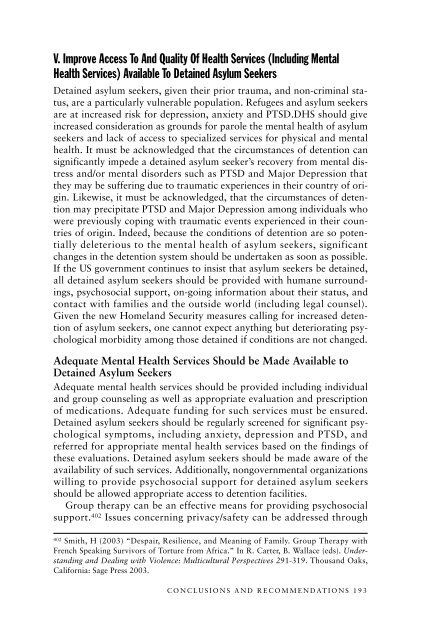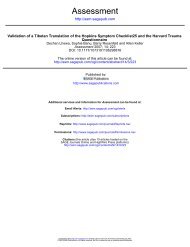From Persecution to Prison - Bellevue/NYU Program for Survivors of ...
From Persecution to Prison - Bellevue/NYU Program for Survivors of ...
From Persecution to Prison - Bellevue/NYU Program for Survivors of ...
Create successful ePaper yourself
Turn your PDF publications into a flip-book with our unique Google optimized e-Paper software.
V. Improve Access To And Quality Of Health Services (Including MentalHealth Services) Available To Detained Asylum SeekersDetained asylum seekers, given their prior trauma, and non-criminal status,are a particularly vulnerable population. Refugees and asylum seekersare at increased risk <strong>for</strong> depression, anxiety and PTSD.DHS should giveincreased consideration as grounds <strong>for</strong> parole the mental health <strong>of</strong> asylumseekers and lack <strong>of</strong> access <strong>to</strong> specialized services <strong>for</strong> physical and mentalhealth. It must be acknowledged that the circumstances <strong>of</strong> detention cansignificantly impede a detained asylum seeker’s recovery from mental distressand/or mental disorders such as PTSD and Major Depression thatthey may be suffering due <strong>to</strong> traumatic experiences in their country <strong>of</strong> origin.Likewise, it must be acknowledged, that the circumstances <strong>of</strong> detentionmay precipitate PTSD and Major Depression among individuals whowere previously coping with traumatic events experienced in their countries<strong>of</strong> origin. Indeed, because the conditions <strong>of</strong> detention are so potentiallydeleterious <strong>to</strong> the mental health <strong>of</strong> asylum seekers, significantchanges in the detention system should be undertaken as soon as possible.If the US government continues <strong>to</strong> insist that asylum seekers be detained,all detained asylum seekers should be provided with humane surroundings,psychosocial support, on-going in<strong>for</strong>mation about their status, andcontact with families and the outside world (including legal counsel).Given the new Homeland Security measures calling <strong>for</strong> increased detention<strong>of</strong> asylum seekers, one cannot expect anything but deteriorating psychologicalmorbidity among those detained if conditions are not changed.Adequate Mental Health Services Should be Made Available <strong>to</strong>Detained Asylum SeekersAdequate mental health services should be provided including individualand group counseling as well as appropriate evaluation and prescription<strong>of</strong> medications. Adequate funding <strong>for</strong> such services must be ensured.Detained asylum seekers should be regularly screened <strong>for</strong> significant psychologicalsymp<strong>to</strong>ms, including anxiety, depression and PTSD, andreferred <strong>for</strong> appropriate mental health services based on the findings <strong>of</strong>these evaluations. Detained asylum seekers should be made aware <strong>of</strong> theavailability <strong>of</strong> such services. Additionally, nongovernmental organizationswilling <strong>to</strong> provide psychosocial support <strong>for</strong> detained asylum seekersshould be allowed appropriate access <strong>to</strong> detention facilities.Group therapy can be an effective means <strong>for</strong> providing psychosocialsupport. 402 Issues concerning privacy/safety can be addressed through402Smith, H (2003) “Despair, Resilience, and Meaning <strong>of</strong> Family. Group Therapy withFrench Speaking <strong>Survivors</strong> <strong>of</strong> Torture from Africa.” In R. Carter, B. Wallace (eds). Understandingand Dealing with Violence: Multicultural Perspectives 291-319. Thousand Oaks,Cali<strong>for</strong>nia: Sage Press 2003.CONCLUSIONS AND RECOMMENDATIONS 193



